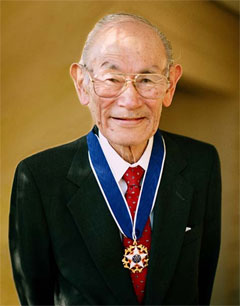Fred Korematsu was born in Oakland, California, on January 30, 1919, to Japanese immigrant parents. Upon graduation from Castlemont High School in 1937, Fred Korematsu wanted to serve his country in the military and attempted to enlist in the United States National Guard and the United States Coast Guard, but was rejected because his Selective Service classification had been changed to “Enemy Alien,” even though he was a citizen of the United States. Fred Korematsu attended the Master School of Welding and worked at the docks in Oakland as a shipyard welder, quickly rising through the ranks to foreman until his union barred all people of Japanese ancestry and his employment was terminated. When World War II broke out, Fred Korematsu suffered from acts of discrimination, as he was turned away from restaurants and barber shops, and denied the right to work, travel, and ultimately to reside in his native State of California.
During World War II, Fred Korematsu was arrested and convicted for defying the exclusion order at a time when persons of Japanese ancestry, including United States citizens, were ordered to live in concentration camps. Four decades later, Korematsu’s wrongful conviction was overturned by Judge Marilyn Hall Patel of the United States District Court for the Northern District of California. In granting Mr. Korematsu’s petition for writ of error coram nobis, Judge Patel acknowledged in her decision that “a grave injustice was done to American citizens and resident aliens of Japanese ancestry who, without individual review or any probative evidence against them, were excluded, removed and detained by the United States during World War II.” Judge Patel further stated, “ Korematsu stands as a caution that in times of distress the shield of military necessity and national security must not be used to protect governmental actions from close scrutiny and accountability. It stands as a caution that in times of international hostility and antagonisms our institutions, legislative, executive, and judicial, must be prepared to exercise their authority to protect all citizens from the petty fears and prejudices that are so easily aroused.”
Fred Korematsu’s lifelong pursuit of justice on his own behalf and for countless others is uniquely symbolic of the founding ideals and traditions of our State and Nation. He remained a tireless advocate for, and is an enduring symbol of, every American’s right to liberty, due process, and equality without regard to race, ethnicity, or national origin.
In 1942, Gordon K. Hirabayashi and Minoru Yasui also defied the curfew imposed on United States citizens and permanent residents of Japanese ancestry. In 1943, Hirabayashi and Yasui were also wrongfully convicted and denied justice by the United States Supreme Court. The Fifth Amendment and the Fourteenth Amendment of the United States Constitution both guarantee a right to due process. These rights were violated when United States citizens and permanent residents of Japanese ancestry were denied the fundamental rights to notice of any criminal charges, the right to attorneys, and the right to a trial. Korematsu, Hirabayashi, and Yasui each took a principled stand at great personal sacrifice in protesting government sanctioned discrimination based on racial heritage and ancestry.
Historical facts: Tens of thousands of Japanese American soldiers fought in Europe, North Africa, and the Pacific during World War II and served with indomitable spirit and valor, including those in the 442nd Infantry, the 100th Infantry Battalion, the 522nd Field Artillery Battalion, the Military Intelligence Service, the 232nd Combat Engineer Company, and the 1399th Engineer Construction Battalion. The 442nd Infantry of the United States Army was a combat team composed primarily of Japanese American soldiers who fought in Europe. Some members of the 442nd were recruited directly from the concentration camps, and many others had relatives that were incarcerated in the camps. Grouped together as the 442nd Regimental Combat Team, the unit became the most decorated unit in United States military history for its size and length of service, receiving seven Presidential Unit Citations, 21 Medals of Honor, 52 Distinguished Service Crosses, 560 Silver Stars, 4,000 Bronze Stars, and numerous additional distinctions.
January 30 of each year in California is designated and set apart as Fred Korematsu Day of Civil Liberties and the Constitution, a day having special significance. (Assembly Bill No. 1775. CHAPTER 241. September 24, 2010)
Source: ca.gov



